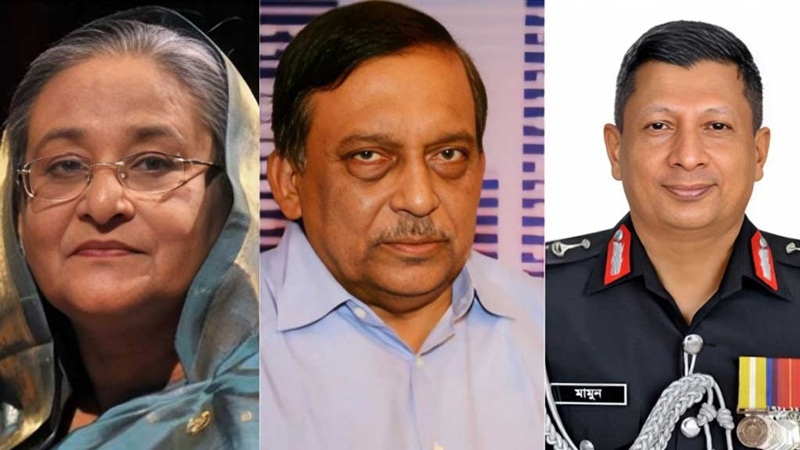- Man held for tying, beating up youth on theft suspicion in Gazipur |
- Sajid (2) lifted after 32 hrs from deep Rajshahi well, not alive |
- Spinning sector seeks urgent govt step to prevent collapse |
- Dilapidated bridge forces Lalmonirhat residents to risk life daily |
- High-level consultation to shape BD climate finance strategy |
Prosecution Seeks Highest Penalty for Sheikh Hasina

The Chief Prosecutor of the International Crimes Tribunal (ICT), Tajul Islam, has sought the highest punishment for former Prime Minister Sheikh Hasina and former Home Minister Asaduzzaman Khan Kamal, as the tribunal concluded the fifth consecutive day of arguments in the crimes against humanity case.
During Thursday’s session, the prosecution also urged the tribunal to order compensation for the victims of the July incidents, to be recovered from what it termed the illegal assets of the accused. The day’s proceedings, held at the ICT-1 courtroom in Dhaka, were broadcast live on BTV and other television channels, drawing wide public attention.
The three-member tribunal bench, led by ICT-1 Chairman Justice Md Golam Mortuza Majumder, with Justice ABM Mahmudur Rahman and Justice Kamrunnahar Begum as members, heard the prosecution’s closing submissions.
Chief Prosecutor Tajul Islam argued that the crimes committed under the leadership of Sheikh Hasina and Asaduzzaman Khan Kamal during the July incidents were of grave and organised nature, amounting to crimes against humanity as defined by international law.
“The evidence presented before this tribunal has clearly established their responsibility,” Tajul said during his closing remarks. “The victims of the July violence deserve justice, and justice cannot be achieved without imposing the highest punishment prescribed by law.”
He added that the prosecution had produced substantial documentary and testimonial evidence, including witness statements, video footage, and recovered official documents linking the accused to the planning and execution of the alleged crimes.
Tajul Islam further appealed for the confiscation of the accused’s properties and assets obtained through illegal means, to be used for rehabilitating and compensating victims and their families.
“The suffering of the July victims cannot be undone, but compensation drawn from the illegal assets of those responsible can be a step toward restorative justice,” he said.
The Chief Prosecutor also addressed the role of former Inspector General of Police (IGP) Chowdhury Abdullah Al Mamun, who became a state approver and the third accused in the case. Tajul Islam told the tribunal that the prosecution would leave the decision regarding his fate to the discretion of the judges.
“Considering his cooperation and testimony, we leave it to this honourable tribunal to determine an appropriate course of action,” he noted.
The ICT-1 bench heard the prosecution’s arguments for five consecutive days, focusing on what prosecutors described as “systematic state-led atrocities” committed during the events that followed the July uprising. The defence is expected to begin its rebuttal next week.
Legal experts say this is one of the most closely watched cases in the history of Bangladesh’s international crimes jurisprudence, given the high-profile nature of the accused and the political ramifications surrounding the case.
The case has drawn widespread attention both domestically and internationally. Rights organisations have been following the proceedings, urging transparency, fairness, and adherence to international legal standards.
Tribunal insiders said the defence teams for Sheikh Hasina and Asaduzzaman Khan Kamal are preparing their final rebuttals, expected to challenge the credibility of witnesses, admissibility of evidence, and the interpretation of command responsibility as applied by the prosecution.
If the tribunal finds the accused guilty of the charges, they could face the maximum punishment under the ICT Act, which includes the death penalty or life imprisonment.
Following the session, several family members of the victims expressed cautious optimism. “We have been waiting for justice for years,” said Momena Akhter, whose brother was killed in the July violence. “We want the court to ensure that those responsible are held accountable, no matter their position.”
Meanwhile, the tribunal announced that the next hearing would resume on Monday, when the defence will begin its closing arguments. After that, the tribunal is expected to set a date for the verdict, marking the final phase of one of the most consequential trials in the country’s recent history.
“This case is not merely about punishing individuals,” Chief Prosecutor Tajul Islam concluded. “It is about upholding the rule of law and ensuring that no one, regardless of power or position, stands above justice.”

